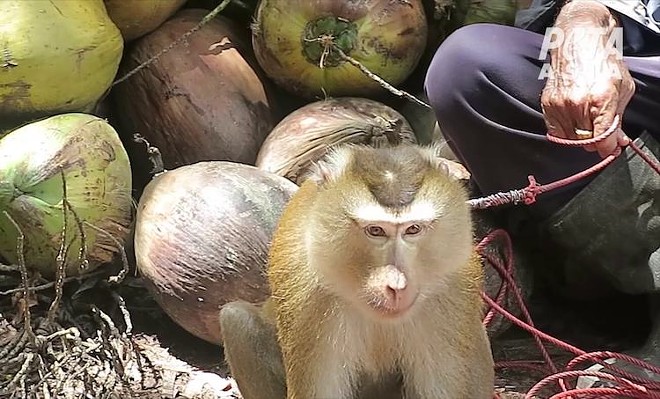Publix won't stop selling coconut milk from company that uses monkey slave labor, says PETA
By Colin Wolf on Wed, Jan 27, 2021 at 11:33 am
After activists with People for the Ethical Treatment of Animals (PETA) dumped coconuts at the Lakeland headquarters of Publix last December, the group now says the grocery giant is still refusing to stop selling coconut milk derived from monkey slaves in Thailand.
Last year, PETA Asia went undercover at eight farms in Thailand, some of which supply coconuts to Chaokoh, a leading producer of coconut milk sold at Publix. The group's findings allege that the monkeys are forced to pick coconuts while being chained to old tires, and live in small enclosures.
"Many monkeys displayed repetitive behavior indicative of extreme mental anguish, including one who chewed on his own limbs," says PETA on its website. "One coconut farmer confirmed that when monkeys are terrified and try to defend themselves, handlers pull their teeth out."
Theppadungporn Coconut Co. Ltd., the main producer of Chaokoh coconut milk, denies PETA’s findings. After the investigation quite a few U.S.-based grocers stopped selling Chaokoh products, including Wegmans, Walgreens, Costco, Food Lion and, just recently, Target.
Publix is still holding out. On Wednesday, the company told Creative Loafing Tampa Bay that it "has reviewed third-party audits of [Theppadungporn] and that Thailand's ambassador to the U.S. assured the company that monkeys are 'not used in the commercial harvesting of coconuts.'"
"We work with our suppliers, industry leaders, governmental agencies and non-governmental organizations because we recognize our responsibility and take concerns about animal welfare seriously," said Maria Brous, Publix Director of Communications. "In this case related to the Chaokoh brand products we carry, we have reviewed the third-party audit and affidavits from the coconut farmers stating that no monkeys are used to pick coconuts on the farms at issue. We have also received the written assurance sent from Thailand's ambassador to the U.S. stating that the Thai Food Processors Association has confirmed that monkeys are not used in the commercial harvesting of coconuts."
However, PETA argues that the entire audit system is bogus, and that farms simply hide monkeys when inspectors visit the farms.
“After a global outcry, the coconut industry claimed to have changed this practice — but PETA Asia’s second investigation found producers still using monkey labor and industry insiders discussing how farms conceal this practice by simply hiding monkeys until auditors leave or by hiring contractors to bring in monkeys only during harvest time," says PETA.
The activist group now says they’re focusing on the remaining U.S. retailers that use the alleged monkey slave coconut milk, including Kroger, Albertsons and Publix.
This post first appeared on our sister website Creative Loafing Tampa.
–
Stay on top of Central Florida news and views with our weekly newsletters, and consider supporting this free publication. Our small but mighty team is working tirelessly to bring you Central Florida news, and every little bit helps.
Last year, PETA Asia went undercover at eight farms in Thailand, some of which supply coconuts to Chaokoh, a leading producer of coconut milk sold at Publix. The group's findings allege that the monkeys are forced to pick coconuts while being chained to old tires, and live in small enclosures.
"Many monkeys displayed repetitive behavior indicative of extreme mental anguish, including one who chewed on his own limbs," says PETA on its website. "One coconut farmer confirmed that when monkeys are terrified and try to defend themselves, handlers pull their teeth out."
Theppadungporn Coconut Co. Ltd., the main producer of Chaokoh coconut milk, denies PETA’s findings. After the investigation quite a few U.S.-based grocers stopped selling Chaokoh products, including Wegmans, Walgreens, Costco, Food Lion and, just recently, Target.
Publix is still holding out. On Wednesday, the company told Creative Loafing Tampa Bay that it "has reviewed third-party audits of [Theppadungporn] and that Thailand's ambassador to the U.S. assured the company that monkeys are 'not used in the commercial harvesting of coconuts.'"
"We work with our suppliers, industry leaders, governmental agencies and non-governmental organizations because we recognize our responsibility and take concerns about animal welfare seriously," said Maria Brous, Publix Director of Communications. "In this case related to the Chaokoh brand products we carry, we have reviewed the third-party audit and affidavits from the coconut farmers stating that no monkeys are used to pick coconuts on the farms at issue. We have also received the written assurance sent from Thailand's ambassador to the U.S. stating that the Thai Food Processors Association has confirmed that monkeys are not used in the commercial harvesting of coconuts."
However, PETA argues that the entire audit system is bogus, and that farms simply hide monkeys when inspectors visit the farms.
“After a global outcry, the coconut industry claimed to have changed this practice — but PETA Asia’s second investigation found producers still using monkey labor and industry insiders discussing how farms conceal this practice by simply hiding monkeys until auditors leave or by hiring contractors to bring in monkeys only during harvest time," says PETA.
The activist group now says they’re focusing on the remaining U.S. retailers that use the alleged monkey slave coconut milk, including Kroger, Albertsons and Publix.
This post first appeared on our sister website Creative Loafing Tampa.
–
Stay on top of Central Florida news and views with our weekly newsletters, and consider supporting this free publication. Our small but mighty team is working tirelessly to bring you Central Florida news, and every little bit helps.

WE LOVE OUR READERS!
Since 1990, Orlando Weekly has served as the free, independent voice of Orlando, and we want to keep it that way.
Becoming an Orlando Weekly Supporter for as little as $5 a month allows us to continue offering readers access to our coverage of local news, food, nightlife, events, and culture with no paywalls.
About The Author
Scroll to read more Orlando Area News articles
Newsletters
Join Orlando Weekly Newsletters
Subscribe now to get the latest news delivered right to your inbox.


















